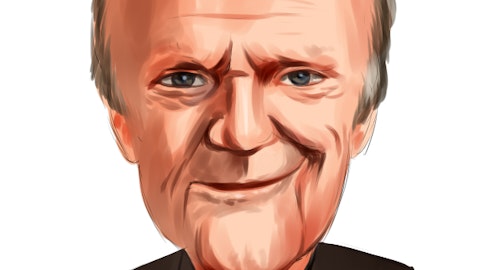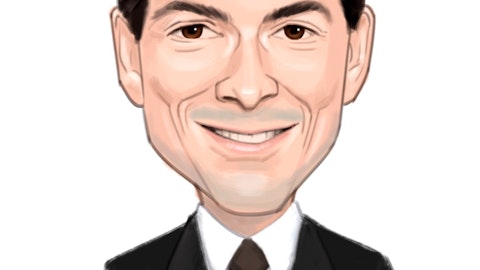In its fourth-quarter letter to investors, Trapeze Asset Management explained why it is likely to sell its Apple stake:
“When we bought Apple a few months ago we noted that at 12x forward earnings investors were not paying the respect it deserved given the company’s continued dominance of high-end smart phones, envious margins and an iPhone 8 super cycle ahead. Just a few months later—despite no developments other than an in-line quarter—Apple has risen very close to our FMV estimate. The market’s sudden enthusiasm for Apple is a good reminder of how expectations can change so quickly—even for the largest company in the world. As value investors, we seek to exploit such mispricing and volatility. We are likely to part with our Apple shares in the near future and deploy proceeds into another company where the risk/reward is more favourable.”
During the fourth quarter, Apple Inc. (NASDAQ:AAPL)’s stock inched up by less than 3%. Looking at its graph, we can see that the stock plunged following its event at the end of October during which the company announced a number of products including a new MacBook. Apparently investors were disappointed by higher-than-expected pricing. In addition, the market was also performing rather poorly weeks ahead of the Presidential election. The stock took another dive right after the election, as investors started piling into other companies expected to benefit under the Trump administration, such as banking, while tech stocks lost ground over uncertainty related to foreign trade policies and possible changes in domestic regulations.
Nevertheless, since mid-November the stock has been gaining ground and is currently nearly 20% in the green year-to-date, as the company posted better-than-expected quarterly results and showed a return to iPhone sales growth with the latest device. Investors also have positive expectations for the iPhone 8, which is expected to be released later this year. Another positive catalyst for the stock is the possible changes to tax laws, which could lead to cuts in corporate taxes as promised by the Trump administration. Apple Inc. (NASDAQ:AAPL) has a lot of cash stashed overseas, so a lower tax rate could allow the tech giant to repatriate the money, a large chunk of which will likely be returned to shareholders, with the rest being spent on M&A deals.
Trading at around 17-times earnings, Apple Inc. (NASDAQ:AAPL) is not as attractive as it was a couple of months ago, when it was trading at a 12-14 multiple. Nevertheless, it is still lower than the S&P 500 average P/E of 21, so it could be seen as a bargain in that light.
Bear case
However, there still are risks, one of the biggest being the high competition in the market. Apple has become the most valuable brand in the world, mainly due to the wide success of the iPhone. The company’s other products are creating an ecosystem centered around the iPhone and, in this way, we can say that Apple is not selling a phone, or a watch, or a laptop, it is selling a lifestyle, which is not necessarily a good thing. Even though iPhone sales have been strong, it’s clear that Apple has been lagging on the technology front lately. It’s just not as innovative as it used to be. Remember BlackBerry Ltd (NASDAQ:BBRY)? Over 10 years ago, a Blackberry was the must-have of every businessman. It was a useful device that also showed the world that you are an important person that must always be connected. Then the iPhone came and things changed and Blackberry’s stock plunged by over 90% (since 2007).
I’ve spoken to Insider Monkey’s research director, Dr. Inan Dogan, who is not long-term bullish on Apple. “This is an extremely competitive industry and you can’t guarantee that Apple won’t be disrupted by a small start-up five years down the road.” A comparison with Blackberry and the current state of the smartphone market, which is slowly but steadily being conquered by small Chinese companies like Xiaomi or Huawei, shows that a P/E of 17 might be too rich for a high-risk, low-return company like Apple.
Disclosure: None





